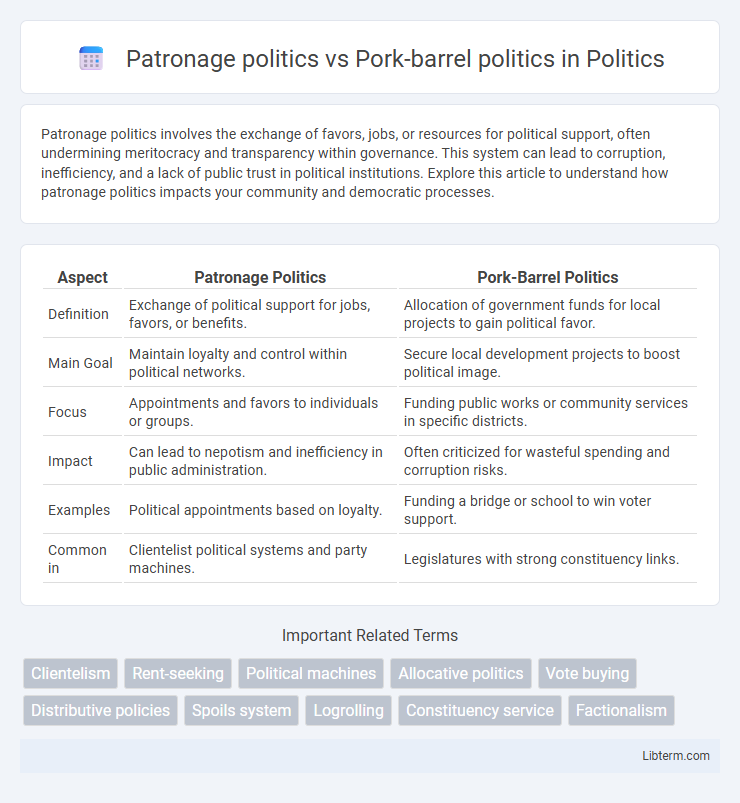Patronage politics involves the exchange of favors, jobs, or resources for political support, often undermining meritocracy and transparency within governance. This system can lead to corruption, inefficiency, and a lack of public trust in political institutions. Explore this article to understand how patronage politics impacts your community and democratic processes.
Table of Comparison
| Aspect | Patronage Politics | Pork-Barrel Politics |
|---|---|---|
| Definition | Exchange of political support for jobs, favors, or benefits. | Allocation of government funds for local projects to gain political favor. |
| Main Goal | Maintain loyalty and control within political networks. | Secure local development projects to boost political image. |
| Focus | Appointments and favors to individuals or groups. | Funding public works or community services in specific districts. |
| Impact | Can lead to nepotism and inefficiency in public administration. | Often criticized for wasteful spending and corruption risks. |
| Examples | Political appointments based on loyalty. | Funding a bridge or school to win voter support. |
| Common in | Clientelist political systems and party machines. | Legislatures with strong constituency links. |
Introduction to Patronage and Pork-Barrel Politics
Patronage politics involves the distribution of government jobs and favors to political supporters as a reward for loyalty and to maintain political control. Pork-barrel politics focuses on allocating government funds for localized projects that primarily benefit a politician's constituents to secure their votes. Both practices highlight the strategic use of public resources to influence political support, yet patronage emphasizes appointments while pork-barrel centers on budgetary allocations.
Defining Patronage Politics
Patronage politics refers to the system where political support is rewarded with jobs, contracts, or favors, often prioritizing loyalty over merit. This form of clientelism strengthens political networks by ensuring that supporters receive tangible benefits, reinforcing power structures. Unlike pork-barrel politics, which typically allocates government spending to local projects to gain voter approval, patronage centers on personalized exchanges between politicians and their followers.
Understanding Pork-Barrel Politics
Pork-barrel politics involves allocating government funds to localized projects that benefit a specific constituency, often to secure political support or votes. This practice contrasts with broader policymaking, as it emphasizes tangible, immediate gains rather than systemic reforms or ideological agendas. Understanding pork-barrel politics requires examining how legislators direct spending to their districts, influencing electoral outcomes and perpetuating clientelism.
Historical Development of Patronage Systems
Patronage politics originated in ancient civilizations such as Rome and Greece, where political leaders granted favors and positions to loyal supporters to consolidate power and maintain social order. Throughout the 19th century in the United States, the "spoils system" exemplified patronage, rewarding political allies with government jobs, which often led to corruption and inefficiency. Reforms like the Pendleton Civil Service Act of 1883 sought to curb patronage by establishing merit-based appointments, differentiating it from contemporary pork-barrel politics that focus on localized funding projects to secure electoral support.
The Evolution of Pork-Barrel Spending
Pork-barrel politics has evolved as a strategic tool in legislative spending, focusing on directing government funds to local projects that benefit constituents and secure political support. Unlike patronage politics, which allocates government jobs or favors based on loyalty, pork-barrel spending emphasizes tangible infrastructure or community improvements to gain voter approval. This shift reflects a more transparent and project-centered approach in securing electoral advantages while influencing public resource distribution.
Key Differences Between Patronage and Pork-Barrel Politics
Patronage politics involves the appointment of individuals to government positions based on political loyalty and support, whereas pork-barrel politics centers on allocating government funds for localized projects to gain voter support. The key difference lies in patronage prioritizing personnel appointments, while pork-barrel emphasizes budgetary spending for targeted benefits. Both practices influence electoral outcomes but differ fundamentally in their mechanisms and objectives.
Impact on Governance and Public Policy
Patronage politics often leads to governance undermined by favoritism, where public resources are allocated based on loyalty rather than merit, resulting in inefficiency and corruption. Pork-barrel politics directs government spending to localized projects primarily to secure electoral support, which can distort budget priorities and promote wasteful expenditures. Both practices compromise the effectiveness of public policy by prioritizing political gain over equitable and strategic development outcomes.
Notable Examples in Global Politics
Patronage politics is exemplified by historical cases like the political machine of Tammany Hall in 19th-century New York, where jobs and favors were exchanged for electoral support. Pork-barrel politics is vividly illustrated by the U.S. Congressional earmarking process, where legislators secure government spending for localized projects to benefit their own districts, as seen in examples like Alaska's "Bridge to Nowhere." Both practices highlight how political resources are utilized strategically to maintain power and secure voter loyalty.
Pros and Cons of Both Political Practices
Patronage politics facilitates political loyalty and social stability by rewarding supporters with government jobs, but it risks fostering nepotism and undermining meritocracy. Pork-barrel politics directs government funds to local projects, boosting regional development and voter satisfaction, yet it can lead to inefficient resource allocation and perpetuate corruption. Both practices influence political dynamics by balancing short-term gains against long-term institutional integrity.
Future Trends and Reform Efforts
Future trends in patronage politics indicate a gradual decline due to increased transparency and digital governance systems that curtail discretionary appointments. Pork-barrel politics faces reform efforts emphasizing stricter budget oversight and allocation transparency through data-driven public expenditure tracking. Both political practices are challenged by growing demands for meritocracy and accountability in democratic institutions worldwide.
Patronage politics Infographic

 libterm.com
libterm.com